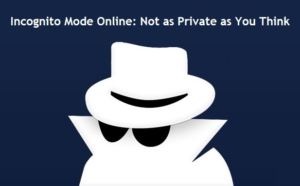
Many people use their browser’s incognito, or private, mode to browse the internet privately. However, this mode doesn’t actually make them as invisible as they think. All the browsing data can still be tracked with the help of users’ IP addresses.
“Private browsing mode makes sure your computer is not storing browsing data locally. This way, your searches, logins, or visited pages can’t be retrieved later. Yet that’s far from completely private,” explains Daniel Markuson, the digital privacy expert at NordVPN. “All your browsing data can still be tracked by your ISP, employer, websites you visit, or any other third party that can access your IP address.”
For example, if a user logs into their Amazon, Facebook, or any other online account, the private mode will not conceal their browsing data from these sites. “Chrome will start recording your cookies and history again if you sign into one of Google’s apps, making the whole incognito thing useless. Google, Apple, and Mozilla, developers of the most popular browsers worldwide with the private mode, are completely upfront about this in their privacy policies,” says Daniel Markuson, digital privacy expert at NordVPN.
However, browsing incognito can be useful as well. It is especially handy if you plan to book flight tickets or hotel rooms. As a private browser window does not save cookies, travel websites cannot see that you have been interested in the specific dates before and hike up the prices accordingly. It is also a good tool if you share the same device with other people or when you are on a public computer.
How to browse privately
Choose another browser. Using one of the major browsers may seem like the most convenient choice for everyday online activities. While it is entirely possible to tweak Google Chrome, Safari or even Microsoft IE with plugins and advanced settings for security and privacy, these are far from their key features. You can choose a less known browser that provides more privacy online.
Choose a private search engine. There are a few search engines that respect your privacy. The most popular one, perhaps, is DuckDuckGo. It doesn’t use cookies, doesn’t store any personal identifiable information, and discards IP addresses from it server logs.
Use Tor for browsing. It’s a powerful privacy tool. It routes your traffic through a series of different nodes before connecting you to your online destination. This way, it becomes difficult to determine where you originally came from. However, Tor may slow down you internet speed considerably.
Start using a virtual private network. It replaces your IP address with that of a remote VPN server, so any online monitoring based on tracking your IP address fails. VPN also encrypts your traffic, hiding your browsing habits from your ISP, hackers, and other third parties. NordVPN is one of the most popular options.
For more information Visit: nordvpn.com.


















